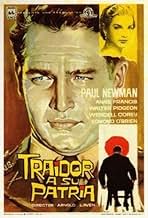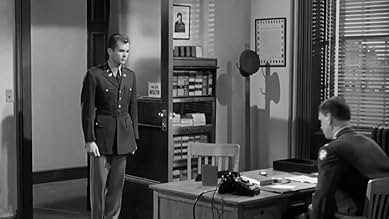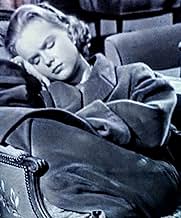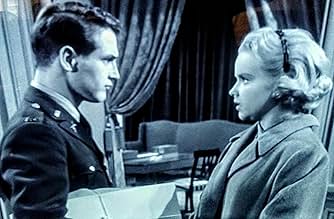Un eroe della guerra di Corea collabora inspiegabilmente con il nemico e affronta la corte marziale.Un eroe della guerra di Corea collabora inspiegabilmente con il nemico e affronta la corte marziale.Un eroe della guerra di Corea collabora inspiegabilmente con il nemico e affronta la corte marziale.
- Law Officer
- (as Robert Simon)
- Courtroom Spectator
- (non citato nei titoli originali)
- Skinny
- (non citato nei titoli originali)
- Student
- (non citato nei titoli originali)
- Family Member
- (non citato nei titoli originali)
Recensioni in evidenza
This is a compassionate film which explores all sides of the argument with understanding and restraint. The prosecution aren't hysterical witch-hunters, and the defence aren't wet-eyed bleeding-hearts. A serious set of issues is explored in an evenhanded but yet passionate manner.
This is fascinating drama - very much of its time and it has dated but that only seems to add to its value.
The ending is ambiguous and may well lead to a heated debate in your family.
I recommend it highly.
*** (out of 4)
Paul Newman, in his third film, plays Korean War vet who was a POW for three years. When he returns home he's brought up on treason charges and faces a court marshall. This film is based on a Rod Serling teleplay so the material makes for a good movie, although in the end I'm not sure what type of message it's sending out. The POW was tortured, not physically but mentally, and the film takes a look at this and what one's breaking point is. A lot of questions about loyalty to your country is brought up during the court scenes but some might be confused by what the ending tries to say or the complete turn around that seems to happen half way through the film. There's also the added plot of Newman's character not being able to connect with his hard boiled father (Walter Pidgeon) and connecting to his dead brother's girlfriend (Ann Francis). The film's screenplay has a lot of great sequences in it but it never really becomes clear on what it's trying to say. Is the film trying to claim that everyone has a breaking point? Is it trying to say that everyone should reach a breaking point but keep going for your country? The film seems to want to have its cake and eat it too as both sides are given credit yet neither takes the stage over the other. What works the best here are the performances with Newman stealing the film with his passionate character. The torture Newman displays is very striking and wonderfully done, which is rather amazing considering this was only his third film. Pidgeon has some equally impressive scenes as does Cloris Leachman. Lee Marvin, playing a tortured vet, also comes across very good in his few scenes. Wendell Corey and Edmond O'Brien are also very good. While the film's message might be someone confusing the film still works as a nice drama with plenty of good performances.
Among films based on courtroom trials this one is remarkable. It rates alongside Bruce Beresford's Australian film "Breaker Morant" and the British film "Term of Trial."
A major feather in the cap is the ending, which is a clever touch by the director Arnold Laven. Any other ending would have made the film less poignant.
The development of the relationship between Newman's character and that of Annie Francis' Aggie is again worthy of note. Lee Marvin's small role catches your attention though it is not his finest by any measure.
All in all this film should be given more publicity, as the theme is relevant today as it was when it was made.
Lo sapevi?
- QuizRod Serling took 19 months to complete the teleplay, the longest he ever spent writing a single screenplay. It also took seven re-writes to get to the final version, the most of any of his screenplays.
- BlooperIn the closing scene inside the courtroom, Capt. Miller (Lee Marvin) conspicuously comes in and sits down in a chair right next to the door, against the back wall. We see him there in a couple of close-up shots, but in several wide camera shots taken from the front of the courtroom, he is nowhere to be seen.
- Citazioni
Lt. Col. Frank Wasnick: [Addressing the jury, presenting the closing arguments for Capt. Hall's defense] Gentlemen, I have here a document which is not very pleasant to read. It's a communiqué written by the Communists describing shortcomings they observed among certain American prisoners of war.
Lt. Col. Frank Wasnick: [Quoting from the document] "One: Many of the prisoners reveal weak loyalties to their families, their communities, and their army. Two: When left alone, they tend to feel deserted, and they underestimate their ability to survive, because they underestimate themselves."
Lt. Col. Frank Wasnick: Now, the report goes on to say that even some of our university graduates have a very dim idea of American history and of the strengths and weaknesses of American democracy and that they are virtually ignorant of Communism, because we have never taken the trouble to inform them of its nature. The Communist program of indoctrination was based on this appraisal - and succeeded, because in many cases, the appraisal was true... And now we must judge Capt. Hall. Gentlemen, if there is guilt, where does it lie? In that small number who defected under pressure, as Capt. Hall did? Or do we not share it? At least those of us who created *part* of a generation which may collapse, because we have left it uninspired, uninformed, and - as in the case of Capt. Hall - unprepared to go the limit, because he had not been given the warmth to support him along the way... And now we must judge Capt. Hall. And let us make absolutely certain, that we have had no part in his collapse. This man has proven himself in the two wars of his youth, who has been exposed to conditions of captivity, against which we have never had to test ourselves.
- Versioni alternativeExists in a computer-colorized version.
- ConnessioniReferenced in American Masters: Rod Serling: Submitted for Your Approval (1995)
I più visti
- How long is The Rack?Powered by Alexa
Dettagli
- Data di uscita
- Paese di origine
- Lingua
- Celebre anche come
- Il traditore del campo 5 (Supplizio)
- Luoghi delle riprese
- Letterman Army Hospital, Presidio, Golden Gate National Recreation Area, San Francisco, California, Stati Uniti(exterior scenes at the army hospital)
- Azienda produttrice
- Vedi altri crediti dell’azienda su IMDbPro
Botteghino
- Budget
- 779.000 USD (previsto)
- Tempo di esecuzione
- 1h 40min(100 min)
- Colore
- Proporzioni
- 1.85 : 1




































